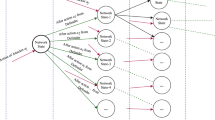Abstract
IoT security is very crucial to IoT applications, and security situational awareness can assess the overall security status of the IoT. Traditional situational awareness methods only consider the unilateral impact of attack or defense, but lackconsideration of joint actions by both parties. Applying game theory to security situational awareness can measure the impact of the opposition and interdependence of the offensive and defensive parties. This paper proposes an IoT security situational awareness method based on Q-Learning and Bayesian game. Through Q-Learning update, the long-term benefits of action strategies in specific states were obtained, and static Bayesian game methods were used to solve the Bayesian Nash Equilibrium of participants of different types. The proposed method comprehensively considers offensive and defensive actions, obtains optimal defense decisions in multi-state and multi-type situations, and evaluates security situation. Experimental results prove the effectiveness of this method.
Access this chapter
Tax calculation will be finalised at checkout
Purchases are for personal use only
Similar content being viewed by others
References
Shi, L., et al.: Survey of research on network security situation awareness. Comput. Eng. Appl. 55(24), 1–9 (2019)
Rapuzzi, R., Repetto, M.: Building situational awareness for network threats in fog/edge computing: emerging paradigms beyond the security perimeter model. Futur. Gener. Comput. Syst. 85, 235–249 (2018)
Park, M., Oh, H., Lee, K.: Security risk measurement for information leakage in IoT-based smart homes from a situational awareness perspective. Sensors 19(9), 2148 (2019)
Chouhan, P.K., McClean, S., Shackleton, M.: Situation assessment to secure IoT applications. In: 2018 Fifth International Conference on Internet of Things: Systems, Management and Security, pp. 70–77. IEEE (2018)
He, F., et al.: SCPN-based game model for security situational awareness in the intenet of things. In: 2018 IEEE Conference on Communications and Network Security (CNS), pp. 1–5. IEEE (2018)
Kaur, R., Kaur, N., Sood, S.K.: Security in IoT network based on stochastic game net model. Int. J. Netw. Manag. 27(4), e1975 (2017)
Zhang, Y., Tan, X.B., Cui, X.L., Xi, H.S.: Network security situation awareness approach based on Markov game model. J. Softw. 22(3), 495–508 (2011)
Huang, J., Zhang, H., Wang, J.: Markov evolutionary games for network defense strategy selection. IEEE Access 5, 19505–19516 (2017)
Lei, C., Ma, D.H., Zhang, H.Q.: Optimal strategy selection for moving target defense based on Markov game. IEEE Access 5, 156–169 (2017)
Wang, Z., et al.: Optimal network defense strategy selection based on Markov Bayesian game. KSII Trans. Internet Inform. Syst. 13(11), 5631–5652 (2019)
Sutton, R.S., Barto, A.G.: Reinforcement Learning: An Introduction. MIT Press (2018)
Wang, J., Yu, D., Zhang, H., Wang, N.: Active defense strategy selection based on the static Bayesian game. J. Xidian Univ. 43(01), 144–150 (2016)
Hu, J., Wellman, M.P.: Nash Q-learning for general-sum stochastic games. J. Mach. Learn. Res. 4, 1039–1069 (2003)
Gibbons, R.: A Primer in Game Theory (1992)
Subba, B., Biswas, S., Karmakar, S.: Intrusion detection in mobile ad-hoc networks: Bayesian game formulation. Eng. Sci. Technol. 19(2), 782–799 (2016)
Wang, Y., et al.: A survey of game theoretic methods for cyber security. In: 2016 IEEE First International Conference on Data Science in Cyberspace (DSC), pp. 631–636. IEEE (2016)
Watkins, C.J.C.H., Dayan, P.: Q-learning. Mach. Learn. 8(3–4), 279–292 (1992)
Shamshirband, S., et al.: Cooperative game theoretic approach using fuzzy Q-learning for detecting and preventing intrusions in wireless sensor networks. Eng. Appl. Artif. Intell. 32, 228–241 (2014)
Acknowledgment
This work is supported by the National Key Research and Development Program of China (No. 2017YFB1400700).
Author information
Authors and Affiliations
Corresponding author
Editor information
Editors and Affiliations
Rights and permissions
Copyright information
© 2021 Springer Nature Singapore Pte Ltd.
About this paper
Cite this paper
Li, Y., Liu, T., Zhu, J., Wang, X. (2021). IoT Security Situational Awareness Based on Q-Learning and Bayesian Game. In: Zeng, J., Qin, P., Jing, W., Song, X., Lu, Z. (eds) Data Science. ICPCSEE 2021. Communications in Computer and Information Science, vol 1452. Springer, Singapore. https://doi.org/10.1007/978-981-16-5943-0_16
Download citation
DOI: https://doi.org/10.1007/978-981-16-5943-0_16
Published:
Publisher Name: Springer, Singapore
Print ISBN: 978-981-16-5942-3
Online ISBN: 978-981-16-5943-0
eBook Packages: Computer ScienceComputer Science (R0)




